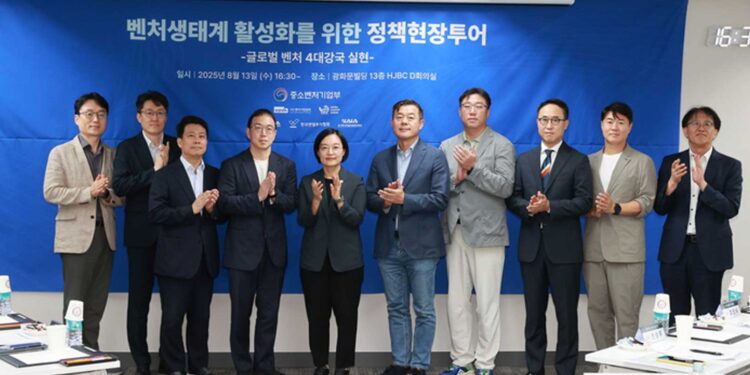South Korea is sharpening its venture playbook. SMEs and Startups Minister Han Seong-sook has delivered a 2025 comprehensive plan to pursue the Top Four Global Venture Nations target through a qualitative shift: regulatory reform, upgraded regulatory sandbox Korea, a stronger Fund of Funds Korea, and capital-market fixes that help startups scale and exit with credibility.
Korean SMEs and Startups Ministry Outlines Path to Top Four Global Venture Nations
The Minister of SMEs and Startups Han Seong-sook attended an official meeting with leaders of South Korea’s venture and startup associations at the Gwanghwamun Building in Seoul on August 13, 2025, as a part of her “policy field tour.”
In this meeting, Minister Han Seong-sook stated that the Korean SMEs and Startups Ministry will prepare a comprehensive plan within 2025 to advance Korea toward the Top Four Global Venture Nations target and to catalyze a Third Venture Boom:
“Thirty years ago, as part of the first generation of Korean venture entrepreneurs, I experienced challenges and achievements firsthand. The third venture boom must be more than expanded investment—it should be a qualitative shift that changes the structure of our economy.”
Han Seong Suk noted that earlier booms delivered scale, yet global competition remains intense. She also pointed to the rapid rise of Chinese ventures as a wake-up call and urged a hard look at whether Korea’s system can continuously produce large, innovative companies:
“The first two venture booms brought significant quantitative growth, but global competition remains tough. The rapid rise of Chinese ventures and startups—challenging even the U.S.—is a clear warning and lesson for us.”
Third Venture Boom: Policy Direction and Objectives
Korean Minister of SMEs and Startups Han Seong-sook framed the new push as a qualitative shift rather than a simple expansion of investment volumes.
Priorities include:
- Building a world-class venture capital market that can repeatedly produce global unicorns.
- Accelerating commercialization of innovative technologies.
- Securing top talent with competitive reward systems.
- Using the AI “superhighway” to create new industries and reset long-term growth engines.
She stated that the ministry aims to drive a transition where capital, technology, and talent work in concert across the Korea venture ecosystem.
Industry Proposals: Regulatory Sandbox Korea, Fund of Funds Korea, and Capital Market Upgrades
At this meeting, representatives from Korean startup and venture industry emphasized detailed requests to underpin the plan:
- Regulatory reform to globalize the innovation ecosystem, including upgraded regulatory sandbox for Korean new industries.
- Stronger lifecycle linkage so Korean venture/startup receive coherent support across stages.
- Expansion of the Fund of Funds Korea budget to drive the Korean venture capital and investment growth.
- Regional investment reinforcement and KOSDAQ activation, alongside exit market diversification.
Additional ideas included expanding designation and operation authority for regulation-free zones at the local level to attract new-industry projects aligned with regional strengths.
Stakeholder Statements and Associations Present
Participants included the Venture Business Association, Korea Startup Forum, Korea Venture Capital Association, Korea Angel Investment Association, and the Early-Stage Investment Accelerator Association.
Venture Business Association Chair Song Byung-jun said ventures continue to deliver results in exports and jobs despite a softer global environment and called for institutional support that enables private-sector innovation capacity to translate into sustained outcomes.
Early-Stage Investment Accelerator Association Chair Jeon Hwa-seong welcomed the supplementary budget’s allocation for accelerator-type mandates within the Fund of Funds and proposed further steps, such as relaxing the mandatory portfolio age for accelerator investments and raising the corporate LP cap in private funds to 50%.
Capital Market and Exit Reforms Under Discussion
Capital-market stakeholders proposed creating a KRW 30 trillion KOSDAQ fund (approx. USD 23 billion) and expanding new capital sources, including pension assets, for venture funds. They also called for growth in secondary funds that support early-stage liquidity.
News reports noted that Fund of Funds expansion appears in the administration’s national policy planning, which raises expectations that budget measures could advance during the plan’s rollout.
Top Four Global Venture Nations: Global Ecosystem Impact and Timeline for the Plan
Minister Han Seong Suk stated that the ministry will continue policy field tours across ventures and startups, SMEs, and small business teams to collect on-the-ground feedback and refine measures.
She also emphasized the ministry’s role as a policy platform that embraces and amplifies challenge and innovation:
“We will carefully review today’s discussions to deliver actionable change. The ministry will fulfill its role as a facilitator of innovation and growth.”
If delivered as outlined, the plan would give the Korea venture ecosystem a stronger foundation for long-term competitiveness by combining three pillars:
- regulatory reform that clears outdated barriers for new industries,
- venture capital expansion that ensures Koreangrowth-stage companies can access patient, risk-tolerant capital, and
- capital-market adjustments that make exits more predictable and diversified.
For startups, this means a better chance to test, scale, and list without being constrained by fragmented policies or limited funding channels. And for investors, it signals a more transparent, globally aligned market environment.
All of which are conditions that could help Korea’s most promising companies grow into global players, in line with the Top Four Global Venture Nations vision.
– Stay Ahead in Korea’s Startup Scene –
Get real-time insights, funding updates, and policy shifts shaping Korea’s innovation ecosystem.
➡️ Follow KoreaTechDesk on LinkedIn, X (Twitter), Threads, Bluesky, Telegram, Facebook, and WhatsApp Channel.






